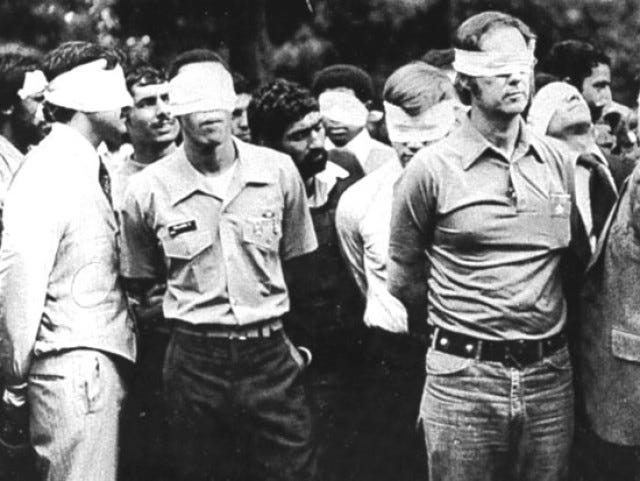U.S. Should Support Israel's Decisive Action Against Iran
It is not neoconservative to recognize that the hated clerical regime in Iran sees itself as at war with America and its allies.
Israel initiated decisive action Thursday night to defend itself against Iran and its long-running nuclear-weapons program. In a still-unfolding conflict, Israel struck targets associated with the regime’s military leadership and nuclear program.
The Jewish state is not only defending itself but the rest of the civilized world—including the United States and its allies in the Middle East.
It’s not the first time.
In June 1981, Israel destroyed a French-built nuclear reactor in Iraq that effectively ended the nuclear-weapons program run by Iraqi madman Saddam Hussein. Everyone criticized Israel, including the United States, but history vindicated Israel.
In 2007, Israel destroyed a nuclear reactor being built in Syria at Al Kibar. North Korea was helping Syria build the reactor that was close copy of the plutonium-breeding reactor that North Korea operated at Yongbyon. The move denied genocidal dictator Bashar al-Assad, who ran Syria at the time, a nuclear capability.
Now, Israel has followed suit against a much larger and more dangerous nuclear-weapons program. Even a crude Iranian nuclear weapon using a portion of its uranium-235 stockpile, enriched only slightly further than its current state, could replicate the 15-kiloton nuclear weapon of similar design the United States used on Hiroshima. If dropped on Tel Aviv today, the Iranians would achieve Holocaust 2.0 in the twinkling of an eye.
It’s not as if Israel didn’t warn the world. It has been nearly thirteen years since Israeli Prime Minister Bibi Netanyahu addressed the U.N. General Assembly in September 2012 with a bomb diagram showing Tehran’s aggressive progress toward a nuclear-weapons capability. Successive Israeli senior officials have repeated the plain message that this was “unacceptable.” Unlike our politicians who throw that word around flippantly, the Israelis mean it in its literal sense.
Israel telegraphed its intention to strike Iran’s nuclear sites last fall when it retaliated for Iranian missile strikes on Israel. In October 2024, Israel didn’t destroy Iran’s nuclear-weapons sites, but did reduce the air defense systems around them. The Iranian regime should have known what would come next.
Still, after threats and counter-threats over so many years, Jerusalem’s decision comes as a shock. The final straw may have been Iran’s vow to accelerate its nuclear program even after this week’s condemnation of Iran by the International Atomic Energy Agency and the exhaustion of U.S. efforts to reach a deal with Iran. Tehran also ignored a Russian offer to reprocess Iranian nuclear fuel, which would have allayed a major Israeli and U.S. concern.
After the Israeli attack began, Secretary of State Marco Rubio denied any U.S. involvement. No senior U.S. official endorsed the action, although Rubio warned Iran not to target U.S. interests in its expected reaction. Trump told Fox News that he was aware of the strikes in advance. He did not condemn them.
Former Singaporean diplomat and longtime Middle East observer Bilahari Kausikan told Bloomberg: “The only way to stop or disrupt Iran becoming a nuclear power is by force and Israel is the only country with both the stomach and capability to do so. Most of the rest of the region particularly Saudi Arabia, U.A.E., and Egypt, will quietly cheer.”
Let’s hope the Trump administration works itself up to a stronger reaction as the situation becomes clearer in the coming days.
Trump and his Middle East envoy, Steve Witkoff, have at times wishcasted that a nuclear deal with Iran was gettable. They even presumed that the Iranian regime would want such a deal to improve the livelihoods of its people—a naive view of the hated clerical regime that has run Iran since it came to power in 1979 while taking American diplomats hostage. That act, along with killing unnumerable thousands of Americans in ensuing years, are treachery for which we ourselves still owe Tehran.
Even though Trump understandably did not want escalation in the Middle East and opposed U.S. military action, we should now give Israel unambiguous political and military support.
Israel’s decision also confronts the New Right in America—of which I am a part—over its own views of foreign policy and the use of national power to shape foreign security and political outcomes. One can recognize the shortcomings of nation-building as practiced during the Bush and Obama years, the hubris of foreign policy pooh-bahs after the end of the Cold War, the bloat of the failed U.S. national security establishment, as well as the sad but crystal-clear failure of democracy during the Arab Spring, and still support allied efforts to backfoot the Iranian government. It is not neoconservative or contrary to a hesitant, Jacksonian, America-first foreign policy to recognize that the Islamist, terrorism-exporting Iranian regime has seen itself as at war with America since it came to power. Nor is it unwarranted to advocate steps to make that regime worry about its survival.
Parts of the New Right and MAGA coalition have risked overcorrection from an interventionist foreign policy. Now is the time to tighten up the new foreign policy, and recognize that there is evil in the world and that not every hostile actor can be mollified with a deal. Furthermore, Americans have always insisted on a role for morality and purpose in our military policy since the Founding Fathers, “appealing to the Supreme Judge of the world for the rectitude of our intentions,” inked the Declaration of Independence.
A real question going forward is how much damage Israel has done to Iran’s nuclear program and how long it will last. Unlike the nuclear programs Israel previously destroyed in Iraq and Syria, Iran’s program is much more complex and diffuse. But Israel has the world’s best intelligence capabilities, including human intelligence that far surpasses the capabilities of the United States. And Tehran has suffered serious setbacks with its Hamas and Houthi proxies losing on the battlefield and the loss of Syria as a political and military ally.
Hopefully the hated Iranian regime is on its knees. Who knows for how long, but if it is, now would be the best time to kick it in the guts. In the meantime, say a prayer for Israelis and others in the Middle East who just want to live their lives free from the specter of nuclear annihilation.








Israel can, will, and should do what it needs to do to ensure its seccurity. Incidentally, Ukraine should also do what it needs to do, and it's actually in a full state of war -- aren't you the same writer who criticized the drone attack on Russian bombers which were being used to bomb Ukraine? Maybe you'll say the two situations are different, which they are, but why do I feel your contrasting positions are more politically-driven than anything else?
The Iranians have had decades to dig in and build bomb-proof nuclear facilities deep underground or in sides of mountains. This is nothing like the shallow mole runs of Gaza. Are we really going to pretend that bombs or even bunker-busters are going to damage these core facilities? What capabilities does Iran have for striking back?